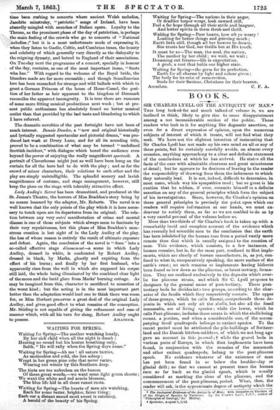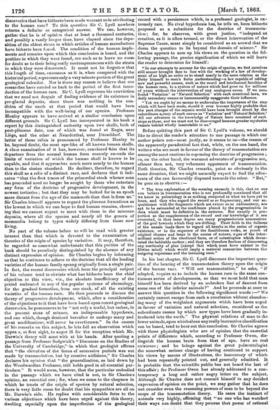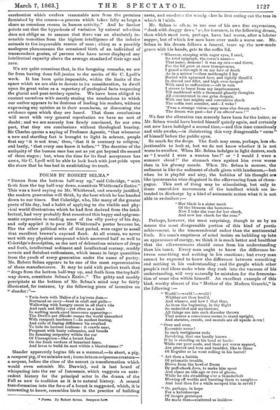BOOKS.
SIR CHARLES LYELL ON THE ANTIQUITY OF MAN.* THIS long looked-for and much talked-of volume is, we are inclined to think, likely to give rise to some disappointment among a not inconsiderable section of the public. Those readers who look to it for anything like dogmatic assertion, or even for a direct expression of opinion, upon the numerous subjects of interest of which it treats, will not find what they seek. We have not the slightest intention of insinuating that Sir Charles Lyell has not made up his own mind on all or any of these points, but he certainly carefully avoids, on almost every occasion, anything approaching to a clear and definite statement of the conclusions at which he has arrived. He states all the facts of the case with admirable clearness and great minuteness of detail; but he appears to be desirous of leaving to the reader the responsibility of drawing from them the inferences to which they naturally lead. It is not, indeed, difficult to determine, in most cases, which way his sympathies tend ; but so great is his caution that he seldom, if ever, commits himself to a definite assertion on any of the general principles which form the subject of his investigations. Since, however, Sir Charles's opinion on these general principles is precisely the point upon which our readers will require information at our hands, we must en- deavour to satisfy them, so far as we are enabled to do so by a very careful perusal of the volume before us.
More than two-thirds of Sir Charles's book is taken up with a remarkably lucid and complete account of the evidence which has recently led scientific men to the conclusion that the earth has been inhabited by the human race from a period vastly more remote than that which is usually assigned to the creation of man. This evidence, which consists, in a few instances, of human remains, but is, for the most part, confined to flint imple- ments, which are clearly of human manufacture, is, as yet, con•• fined to what is, comparatively speaking, the mere surface of the earth's crust ; no such remains or implements having hitherto been found so low down as the pliocene, or latest tertiary, forma- tion. They are confined exclusively to the deposits which over- lie the pliocene strata, and which Sir C. Lyell proposes to designate by the general name of post-tertiary. These post- tertiary beds he divides into two groups, according to the char- acter of the fossils which they respectively contain. The upper of these groups, which he calls Recent, comprehends those de- posits in which not only all the shells, but also all the fossil mammalia, are of living species ; while the lower, which he calls Post-pliocene, includes those strata in which the shells being recent, a portion, and often a considerable one, of the accom- panying fossil quadrupeds belongs to extinct species. To the recent period must be attributed the pile-buildings of Switzer- land and the Danish kitchen-middens, of which we not long ago gave an account in this journal ; t while the gravel beds in various parts of Europe, in which flint implements have been found, in conjunction with the remains of the mammoth and other extinct quadrupeds, belong to the post-pliocene epoch. No evidence whatever of the existence of man has yet been found in or below the boulder-clay or glacial drift; so that we cannot at present trace the human race so far back as the glacial epoch, which is usually considered as marking the close of the pliocene, and the commencement of the post7pliocone, period. What, then, the reader will ask, is the approximate degree of antiquity which the '0 The Geological Evidences of the Antigmly of Man; with Remarks on Theories of of the Origin. of Species by Variation. By Sir Charles Lyel', author of "Principles of Geology," &c. Murray.
+ Spectator, August ',1E62.
discoveries that have hitherto been made warrant us in attributing to the human race? To this question Sir C. Lyell nowhere returns a definite or categorical answer. We can, however, gather that he is of opinion that at least a thousand centuries, and possibly a vastly longer time, have elapsed since the depo- sition of the oldest strata in which articles of human manufacture have hitherto been faund. The condition of the human imple- ments and remains upon which this conclusion is based, and the position in which they were found, are such as to leave no room for doubt as to their being really contemporaneous with the strata in which they were discovered. It must not be forgotten that this length of time, enormous as it is, when compared with the historical period, represents only a very minute portion of the great geological calendar. Nor is there any reason to believe that our researches have carried us back to the period of the first intro- duction of the human race. Sir C. Lyell expresses his conviction that we need not despair of finding evidence of its existence in pre-glacial deposits, since there was nothing in the con- dition of the earth at that period that would have been incompatible with the well-being of our species. Professor Huxley appears to have arrived at a similar conclusion upon different grounds. Sir C. Lyell has incorporated in his book a report by this distinguished authority upon two skulls, both of post-pliocene date, one of which was found at Engirt, near Liege, and the other at Nearderthal, near Diisseldorf. The latter of these relics is pronounced by Professor Huxley to be, beyond doubt, the most ape-like of all known human skulls. A close examination of it has, however, convinced shim that its departure from the normal human form scarcely exceeds the limits of variation of which the human skull is known to be capable, and that it approaches much more nearly to the human than to the simian standard. He declines, therefore, to regard this skull as a relic of a distinct race, and declares that it indi- cates "that the first traces of the primordial stock whence man has proceeded need no longer be sought by those who entertain any form of the doctrine of progressive development, in the newest tertiaries ; but that they may be looked for in an epoch more distant from the age of the mammoth than that is from us." Sir Charles himself appears to regard the pliocene formations as the lowest in which wo can hope to find human remains, observ- ing that we cannot expect to meet with them in the miocene deposits, where all the species and nearly all the genera of mammalia belong to types widely differing from those now living.
No part of the volume before us will be read with greater interest than that which is devoted to the examination of theories of the origin of species by variation. It may, therefore, be regarded as somewhat unfortunate that this portion of the book should be peculiarly distinguished by the absence of any distinct expression of opinion. Sir Charles begins by informing us that he continues to adhere to the doctrine that all the leading varieties of the human family sprang originally from a single pair. In fact, the recent discoveries which form the principal subject of his volume tend to obviate what has hitherto been the chief objection to this view, viz., the absolute insufficiency of the period embraced in any of the popular systems of chronology, for the gradual formation, from one stock, of all the existing varieties of the human race. He then proceeds to discuss the theory of progressive development, which, after a consideration of the objections to it that have been based upon recent geological discoveries, he pronounces to be " not only a useful, but rather, in the present state of science, an indispensable hypothesis, and one which, though destined hereafter to undergo many and great modifications, will never be overthrown." In the course of his remarks on this subject, he lets fall an observation which appea a, at fist sight, to augur ill for the reception which Mr. Darwin's theory will meet with at his hands. After quoting a passage from Professor Sedgwick's " Discourse on the Studies of the University of Cambridge,"• in which that geologist affirms that "the elevation of the fauna of successive periods was not made by transmutation, but by creative additions," Sir Charles declares his opinion that " the generalization, as laid down by the Woodwardian Professor, still holds good in all essential par- ticulars." It would seem, however, that the particular embodied in the passage which we have cited is not, in Sir Charles's opinion, an essential one ; for, when we come to the chapters in which he treats of the origin of species by natural selection, there is very little room for doubt that his sympathies are all on Mr. Darwin's side. He replies with considerable foice to the various objections which have been urged against this theory, dwelling especially upon the imperfection of the geological record with a persistence which, in a professed geologist, is ex- tremely rare. No rival hypothesis has, he tells us, been hitherto_ proposed as a substitute for the doctrine of transmuta- tion ; for, he observes, with great justice, " independt nt creation, as it is often termed, or the direct intervention of the Supreme Cause, must simply be considered as an avowal that we deem the question to lie beyond the domain of science." Sir Charles appears to sum up his views on the question in the fol- lowing passage, the precise signification of which we will leave the reader to determine for himself :
"In our attempts to account for the origin of species, we find ourselves still sooner brought face to face with the working of a law of develop- ment of so high an order as to stand nearly iu the same relation as the Deity himself to man's finite understanding—a law capable of adding new and powerful causes, such as the moral and intellectual faculties of the human race, to a system of nature which had gone on for millions of years without the intervention of any analogous cause. If we con- found' Variation' or Natural Selection' with such creational laws, we deify secondary causes or immeasurably exaggerate their influence.
"Yet we ought 14 no means to undervalue the importance of the step which will have been made, should it ever become highly probable that the past changes of the organic world have been brought about by the subordinate agency of such causes as Variation' and' Natural Selection.' All our advances in the knowledge of Nature have consisted of such steps as these, and we must not be discouraged because greater mysteries remain behind wholly inscrutable to us."
Before quitting this part of Sir C. Lyell's volume, we should
like to direct the reader's attention to one passage in which our author points out—moat justly, as it seems to us—the reason of the apparently paradoxical fact that, while, on the one hand, the
writers who are most in favour of the theory of transmutation are among the most cautious in espousing the doctrine of progression ; so, ou the other hand, the warmest advocates of progression are, oftener than not, very vehement opponents of transmutation. Both theories, Sir Charles remarks, poiut so obviously iii the same direction, that we might naturally expect to find the adhe- rents of the one favourably disposed towards the other. "But," he goes on to observe :-
" The true explanation of the seeming anomaly is this, that no one Can believe in transmutation who is not profoundly convinced that all we know in palontology is as nothing compared to what we have yet to learn, and they wbo regard the record as so fragmentary, and our ac- quaintance with the fragments which are extant as so rudimentary, are apt to be astounded at the confidence placed by the progressiouists in data which must be defective in the extreme. But exactly in pro- portion as the completeness of the record and our knowledge of it are overrated, in that same degree are many progressionists unconscious of the goal towards which they are drifting. Their faith in the fullness of the annals leads them to regard all breaks in the series of organic existence, or iu the sequence of the fossiliferous mocks, as proofs of original chasms and leaps in the course of nature, egns of the inter- mittent action of the creational force, or of catastrophes which devas- tated the habitable surface ; and they are therefore fearless of discovering any continuity of plan (except that which must have existed in the Divine mind) which would imply a material connection between the outgoing organisms and the incoming ones."
In his last chapter, Sir C. Lyell discusses the important ques- tion of the bearing of the transmutation theory upon the origin of the human race. " Will not transmutation," he asks, " if adopted, require us to include the human race iu the same con- tinuous series of developments, so that we must hold that man himself has been derived by an unbroken line of descent from some one of the inferior animals?" And he proceeds at ouce to answer this question in the following significant words :—" We certainly cannot escape from such a conclusion without abandon- ing many of the weightiest arguments which have been urged in favour of variation and natural selection, considered as the subordinate causes by which new types have been gradually in- troduced into the earth." The physical relations of man to the lower animals, upon which alone any really instructive classification can be based, tend to bear out this conclusion. Sir Charles agrees with those physiologists who are of opinion that the essential points of difference which, according to Professor Owen, dis- tinguish the human brain from that of ape, have no real existence ; and he brings against the great palmontologist the somewhat serious charge of having continued to support his views by means of illustrations, the inaccuracy of which had been repeatedly pointed out, and generally admitted. It is probable that the scientific public has not heard the last of this affair ; for Professor Owen has already addressed to a con- temporary a long and rather angry letter on the subject. Although Sir Charles does not commit himself to any decided expression of opinion on the point, we may gather that he does not consider even the reasoning powers of man to be beyond the scope of the transmutation theory. He rates the instinct of animals very highly, affirming that " no one who has watched their ways can doubt that they possess that power of rational cerebration which evolves reasonable acts from the premises furnished by the senses—a process which takes fully as large a share as conscious reason in human activity." And be further points out that the hypothesis of variation by natural selection does not oblige us to assume that there was an absolutely in- sensible transition from the highest intelligence of the inferior animals to the improvable reason of man ; citing as a possibly analogous phenomenon the occasional birth of an individual of transcendent genius, of parents who have never displayed any intellectual capacity above the average standard of their age and race.
We are quite conscious that, in the foregoing remarks, we are far from having done full justice to the merits of Sir C. Lyell's work. It has been quite impossible, within the limits of the space which we are able to devote to its consideration, to dwell upon its great value as a repertory of geological facts respecting the glacial and post-tertiary epochs. We have been obliged to content ourselves with merely stating the conclusions to which our author appears to be desirous of leading his readers, without expressing any opinion as to their soundness, or discussing the evidence upon which they are based. That these conclusions will meet with very general reprobation we have no sort of doubt ; and we are scarcely less firmly convinced, for our own part, that they are conclusions without theological bearing. Sir Charles quotes a saying of Professor Agassiz, "that whenever a new and startling fact is brought to light in science, people first say it is not true,' then, ' that it is contrary to religion,' and lastly, that every one knew it before." The doctrine of the antiquity of the human race has not as yet got beyond the second of these stages; but, when the time for its final acceptance has come, Sir C. Lyell will be able to look back with just pride upon the share that he has had in establishing its truth.




























































 Previous page
Previous page